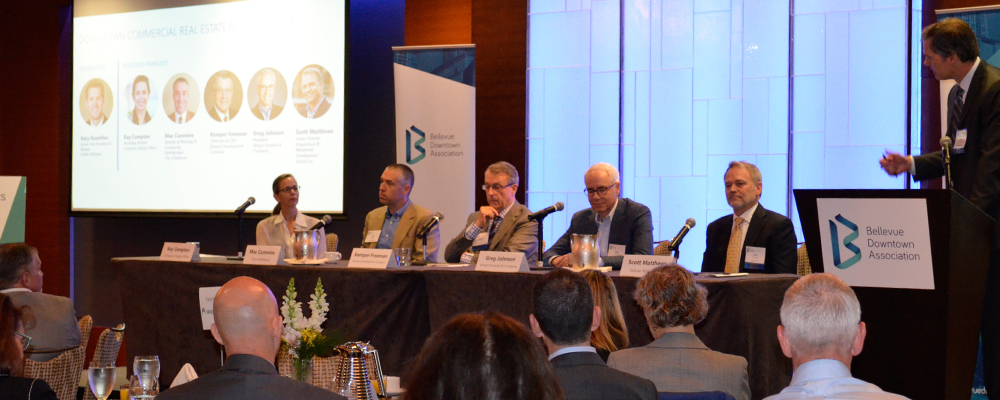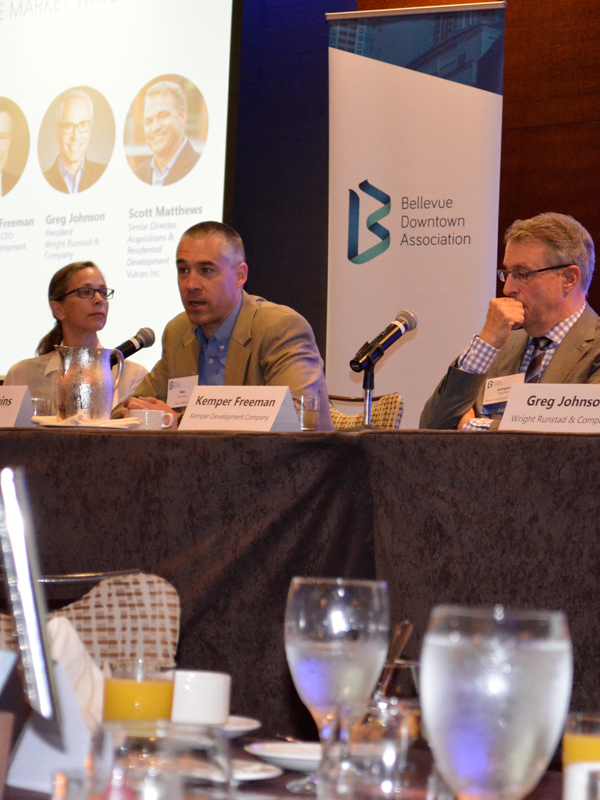Bellevue Commercial Real Estate Market Watch
June 28, 2018 - by Emma Sullivan
Category What's Happening
Bellevue Commercial Real Estate Market Watch
Emma Sullivan, June 28, 2018
Tuesday morning at our June BDA Breakfast, our expert panel gave us an inside look at market trends driving real estate decisions in and around Downtown Bellevue. Our panel explored the current pipeline, the design of things to come, potential zoning changes for East Main and Wilburton, and the expanding Spring District. We navigated submarket trends at work affecting rents, vacancies and tenant demand. Thank you again to everyone who joined us for this sold-out breakfast!

A special 'thank you' to our wonderful moderator & panelists:
Featured Panelists

Kay Compton, Founding Partner
Compton Design Office
Compton Design Office was founded with the recognition that the traditional roles of architects and architecture have fundamentally changed. The rapid expansion of information, virtual social and professional structures, building technologies and processes, and the imperative response to the environment and sustainable systems, have all opened up new ways of looking at team building and creating. These new factors are an opportunity to be nimble and deliver a higher level of design and problem solving in a succinct fashion.

Mac Cummins, Director of Planning & Community Development
City of Bellevue
Over the course of his career, Cummins has overseen administration of redevelopment, zoning administrator functions, management of development review and a "one stop shop," visioning and long range planning, economic development, affordable housing programs, CDBG and HOME program (s), environmental stewardship programs, and neighborhood services & outreach strategies. He has been with the City of Bellevue since June of 2017.

F. Kemper Freeman Jr., Chairman & CEO
Kemper Development Company
As principal owner and hands-on leader of the development team, Mr. Freeman has earned a national reputation as a civic leader and businessman with integrity and a win-win philosophy. He has been engaged in real estate development in Bellevue since the 1960s. Mr. Freeman is also active in political affairs and issues on a local, regional, and national level. He was elected to three terms in the state legislature and served as chairman of the International Council of Shopping Centers (ICSC) in 1994–95. Mr. Freeman is on the BDA’s Board of Directors.

Greg Johnson, President
Wright Runstad & Company
Greg Johnson is the President of Wright Runstad & Company. Based in Seattle, Washington, Wright Runstad & Company develops, acquires, manages and leases high-quality commercial office buildings and mixed-use properties throughout the Pacific Northwest. Now in its fifth decade, Wright Runstad has developed in excess of 16 million square feet in over 35 major projects and is an established leader in sustainable development and operations. Johnson is on the BDA’s Board of Directors.

Scott Matthews, Senior Director, Acquisitions & Residential Development
Vulcan Inc.
Scott Matthews has more than 25 years of development and management experience in multiple product types including multifamily housing. In his current role, Matthews oversees Vulcan’s residential and mixed-use development projects in the Pacific Northwest and leads the strategic North American acquisition efforts for Vulcan's real estate portfolio. Matthews is on the BDA Board of Directors.

Gary Guenther, Senior Vice President & Partner (Moderator)
Kidder Mathews
Gary Guenther is a Senior Vice President, Partner, and has served on the Board of Directors at Kidder Mathews. Prior to joining Kidder Mathews, Guenther worked with the real estate affiliate of the Government of Singapore. He is recognized as one of the most successful and trusted commercial real estate advisors in the Puget Sound Region and is on the BDA’s Board of Directors.
Interested in learning more? Read on.
Gary Guenther started off with market highlights for the Downtown Bellevue area:
- 1.5 million square feet of office has been developed in Downtown Bellevue in the past year. These towers are 99% leased.
- Amazon has moved in to Downtown Bellevue with additional plans for expansion.
- We are having record setting sales; in the past week, two buildings on the Eastside sold for more than $250 million each.
- We have reached the $60/square foot mark for Class A office space in Downtown Bellevue.
- There are more than 2,000 multi-family units currently under construction in Downtown Bellevue and along the Bel-Red corridor with more projects in the pipeline.
- The second fastest growing neighborhood in the region is Downtown Bellevue (the fastest growing is South Lake Union).
- The Bellevue-Seattle market is the top commercial real estate market in the country. The City's land use policies and zoning framework have helped to enable this in Bellevue.
- This is the number one market in the country for net migration of millennials.
We asked our panel a series of questions about the Downtown area. Below is a quick recap of the questions asked and the responses given by our panelists. (Not every panelist answered every question).
 Question 1:
Question 1:
How has a career failure in real estate, or a current failure, set you up for future success? What did you learn from it?
Kay: "The biggest failure was not starting my office in Bellevue! Prior to 2008, we started a project that we put a lot of time and energy and emotion into but it got stalled by the recession and because we were waiting for the right motion. Architecture is about emotion but real estate is not about emotion, it's about business. Lesson learned is trust your gut and act if the market is hot. The second lesson learned is flexibility - don't limit your designs for a single use. By designing with flexibility, it set us up better in the future."
Mac: "I was in Downtown Scottsdale in the early to mid 2000s. That was a time in their history when they believed that the economy would never, ever stop. Landowners and real estate developers started to get very speculative - then June 2008 happened and it all came crashing down. What are the lessons learned from a city economic development standpoint? It's to understand that those cycles are going to happen - you need to look at the long term horizon particularly as it relates to public investment."
Kemper: "I want to talk about a moment in the 80s when everyone was excited about building the first true mixed-use project in the region - Bellevue Place. Everyone told me, 'whatever you do, don't own the hotel' but we couldn't find anyone else to own the hotel, fell in love with the hotel, and ended up building the Hyatt Regency Hotel. We then walked straight into the worst real estate recession in my life so far. We lost $200,000 a month for four years. And yet, when the economy turned around, we got most of that paid back in a year. It was a great character-building moment and a great lesson - when it's going great, it seems like it's never going to end, but it will cool off, we just don't know when."
Greg: "In the early 90s I was working for a Canadian developer in California. One day, I walked into the office and was told 'we're done, office is closing.' What I learned later was that the company had pledged assets elsewhere and when the market turned there, it took the entire company down. What this taught me was that even if your market might be thriving, there are things going on in other parts of the country that can change that in an instant. On a more personal level, I learned to always keep my head up and be nimble and be ready to take on the unexpected."
Scott: "This is a bit of a 'trust-your-gut' lesson. There was one major financial decision I made where I really suppressed my gut because I was hoping for a positive outcome and in the end everything I thought might go wrong did go wrong. When I was telling my wife about this last night, she reminded me that there were two lessons learned. She went downstairs, got a piece of paper (from that time), and said 'it wasn't your gut you weren't listening to, it was me.' Trust your gut and listen to your wife.
Question 2
How is the market different now than it was ten years ago, and how can you adjust to the changes?
Kemper: "The biggest difference is that it's better. I've never seen all sectors on fire like they are now. Again, it won't go on forever, but I never dreamed growing up that there would be a time when Seattle and Bellevue would be the hottest markets in the country."
Greg: "I'll echo Kemper. It's really remarkable what's going on now. We're not just seeing growth of strong local and regional companies but also a huge influx of international investment - global high tech players from outside the region."
Scott: "For us now the paradigm is shifting...what's happening is likely to continue but how do you interpret these really fundamental changes around the workforce, growth around the millennial population, etc? You want to be cutting edge but you don't want to be bleeding edge."
Mac: "I don't find it that odd that Bellevue is experiencing hyper-growth right now. When I look around the country and look at other markets, there is a big-time desire for suburban-urban markets like Downtown Bellevue, and Downtown Bellevue has a legacy of planning itself out for growth in a way that other markets don't. What I find most fascinating so far is that the Pacific Northwest is fairly homogenous in its developers and in its real estate market, which is different from other places when there is a tremendous amount of out-of-state investment. I think we're about to turn the corner and start to see a tremendous amount of out-of-state, out-of-country investment. Understanding that dynamic will be critical."
Question 3
Looking at office design, what amenities are office tenants thinkings? What do you think will be trends in the future?
Kay: "The new tenants want everything. They want floor-to-ceiling glass, they secure amenities, they want outdoor space, they want an amazing public environment...vibrant retail, parks...there's more demand than ever on what tenants are looking for. The question is whether Bellevue is ready to meet these needs?"
Kemper: "It's amazing, one of our biggest tenants is WeWork and we were the fastest lease up in their history and they just added another floor and a half. The amenities they have are amazing...it sets the stage for other office."
Greg: "There are two major projects I'd like to highlight in the Spring District - the Global Innovation Exchange (GIX) and REI's new headquarters. I think there is a shift as you see larger organizations making strategic decisions about where they want to go, they are willing to step up and make commitments before buildings are constructed. I wouldn't be surprised if that trend doesn't continue."
Scott: "To Kay's point, the focus increasingly is on what's outside and not just what's inside...the neighborhood, transportation...those things are more and more important. On the Eastside, the light rail will open up connections on both sides of the lake."
 Question 4
Question 4
What kind of cross-generational challenges are you seeing in terms of design? Does it come up in conversation?
Kemper: "I think one of the differences is what takes place outside of the office. Great retail is the greatest catalyst for all the other forms of commercial real estate. Within that group, restaurants are just amazing. Having restaurants, retail and more within walking distance is key; Microsoft says that their Downtown Bellevue office is the favorite place to work out of 95 locations in the world."
Greg: "The other dynamic we've noticed is the privacy equation...the acceptability of wearing head phones in the office as an indicator of 'do not disturb' instead of a closed office door. Looking outside the office space, as we interface with users, we're noticing that the variety of interior spaces is important but the neighborhood environment is critical too."
Mac: "There's a common theme about the public realm and the space in and around a building including the creation of a neighborhood. We're having our economic development group study this right now; if you look across the country, there are a number of major metropolitan markets where there's more in-migration than there is job growth. The reason that's occurring, we think, is because a number of young people are moving to locations because they want to be there, not because that's just where their job happened to be.
People are going to places they want to be, and then finding jobs afterwards. There's a pretty fundamental question that's being asked: in the future, is labor going to follow capital, or is capital going to follow labor? The creation of a city is everything in terms of labor retention attraction. Restaurants, retail, and people generating land uses, these are the things that make office workers super excited to go to work."
Question 5
Look in your crystal ball. We've been in an economic expansion about nine years in. How much longer do you think we have in this development cycle, and what, potentially, could end it?
Kemper: "Wish I had a good crystal ball. We're about two or three months beyond the normal cycle of a boom time so we're on borrowed time. It's a time to be sober... I'm making a three year bet on a pretty large project so I think we'll be safe during that time but sooner or later it's going to stop or slow down."
Greg: "Exactly 26.5 months from now. Jokes aside, as we interface with the tenants in our office buildings, we are always questioning and probing...'where are you hiring, is there any softness?' So far we hear that they are still hiring, they don't see any softness. So on a local level, things look good. Anecdotally, when you look out beyond the local horizon, you've got global economic forces at work, you've got a flattening yield curve...there's signals that we're going into a slowdown."
Scott: "I need to leave so that I can use this information... We think the residential rental market peaked probably nine months, maybe a year ago. The trajectory it was on was really unsustainable and unprecedented. That being said, we have about a thousand units under construction. Real estate cycles are slightly different than the economic cycles but the pressures we're seeing around cost will choke the golden goose in the near future. Construction costs are rising approximately 4-5%, and rents are not growing at 4-5%. There may be users that are prepared to compare incrementally higher rents just to be in the region, which will keep the fly wheel going a little longer and are blessed to have homegrown global companies anchoring our region. We won the lottery with Microsoft and won it again with Amazon and now we're importing world class companies from California, but I think the cost will choke things off."
Mac: "I guess I would say that being new to this marketplace, one thing I observe is it's starting to feel to me a little bit like 2008. It does feel like people are getting more and more anxious to put a deal together, and people are saying 'I want to get this done before the end of the cycle," which might be an indication that everyone is concerned. In my mind, big picture, the thing to be concerned about is that there are an awful lot of rental units going up and very little stacked ownership products. This has tremendous impacts on the affordable housing situation in the region, which is intrinsically linked to the ability to attract labor to the region. There's a lot of things going on in the ecosystem at once, and hopefully we'll see more of a plateauing effect instead of a collapse."
Kay: "An architect is the equivalent to the canary in the coal mine. The bird is still singing but the song is not as loud. We are starting to see a little bit of a slipping, especially in the commercial mixed-use marketplace. We've seen that construction starts are down more than 50% on the Seattle side. However, the overall Puget Sound Region is still so strong and I think we're still in good shape."
Question 6
We hear a lot about the death of brick-and-mortar retail (Kemper, you are obviously the exception), but in general, what is the retail climate like? How are shoppers responding to brick and mortar stores? How is the experience today different, and how is that going to change?
Kemper: "It's been in the news for about four years now that brick and mortar retail has died. We're having the best year ever and last month was the best in history by a huge amount. The basic truth is two things: the internet is not our enemy it's our friend. What is wrong nationwide is that America overbuilt it's retail. (We have twice as many square feet of retail per customer as Canada, which has twice as much as England, which has twice as much as Germany, and it goes on). The amazing thing is that we've been over-building for 25 years and haven't seen the slowdown until now. Good retail has never been better and the better shopping centers are having the best sales experience ever. Last month nationwide, retail grew about 1%, we grew over 30% just in sales. Retail hasn't died, at least not here in Bellevue...but it's taken 72 years to learn how to do it, and it's not something that everyone knows how to do."
Kay: "This comes back to the conversation about place making, and how critical it is to thriving urban areas. What is often missing isn't the sales-focused retail but the service-focused retail...the barbershops, the small markets, the gyms. It's interesting when looking at restaurants and other entertainment focused retail and the younger generation; we see the swarming mentality. Locations will be wildly popular until the next 'cool thing' develops and then businesses are left with trying to figure out how to keep the customers coming back."
Question 7
What future relationship do you foresee between Downtown, the Spring District, and Wilburton, and how is that going to impact the market?
Mac: "All three of those neighborhoods are going to have very distinct characters, but the marketplace is going to see them bleeding together. Between the Spring District and Downtown it's just a fifteen minute walk, but nobody thinks of it that way because of the format of the roads, and Wilburton Hill and the traffic, but it's really fairly close. As the City is looking at things like the Grand Connection, and getting across the freeway, and Sound Transit is finishing up the light rail, the office market will be intrinsically linked. You'll be able to get on and off the light rail one stop away from the Bravern, for example, or Wilburton. The differences in the marketplace are going to be, primarily, in the retail and hospitality markets, and how those neighborhoods will evolve organically. There will be a very different feel when you're walking around the future Spring District, than when you're walking around Downtown. The short answer is that these areas will be symbiotically linked, but they will be very different."
Greg: "The Downtown, Wilburton, Spring District, and also Redmond will soon be connected by the light rail. We anticipate increased density around the stations, and a real emergence of neighborhoods with different characters. The outcome of the character of these neighborhoods is heavily dependent on the City zoning and regulation. In the Spring District, we were focused on creating an environment that complements other areas of Bellevue and that gives people that live and work an alternative to these other parts. I think this played out in REI's decision to move to Bellevue - I don't think you could picture REI in Downtown, or out in Sunset by where T-Mobile is."
 Question 8
Question 8
Scott, Vulcan has made some pretty big bets in Downtown recently. What factors do you look at, other than the obvious, when making a decision? It's got to be a little more complicated than building a building and having Amazon lease it.
Scott: "When that happens, we're okay with it. We had a number of potential investments we were looking at in Bellevue before we were successful in acquiring one...at least ten. We were fortunate enough to acquire Bellevue Plaza when it came around. This was pre-livability up-zone, so we originally thought of this as a multifamily opportunity, but after the up-zone, we are now planning over a million square feet of phased office space. The great thing about Bellevue is that there a lot of options here for companies, that can accommodate a wide variety of users."
FINAL QUESTION
What are your market assumptions and insights telling you, and what can you share with all of us here in the audience so that we can all be prepared moving forward?
Kay: "I think that Downtown is going to change in a very positive way. I believe that the character of the buildings will be much stronger and going more dense is going to be the way to go. The trick is always going to be transportation - every project has to deal with it. Public transportation has to really work, and it's the Achilles heel on this thing."
Mac: "The future is very bright for Bellevue and for the whole Eastside. Looking at the future of the marketplace from the City's perspective, I am always cognizant of reducing transaction costs and how can the public sector set in motion a playing field that makes the business cycle of development easier to get to a common vision for future growth. The City taking proactive steps to update zoning the Bel-Red and Spring District and now Wilburton will hopefully eventually reduce transaction costs and long public processes. We are trying to be ahead of that curve. Right now, looking at Downtown and through the Bel-Red corridor, there's a delta of 30 million square feet between what is currently built on the ground and what the zoning allows - there's tremendous capacity to come in and build projects. As we look into the future, having commonality in vision and setting and place is really important and we need to be sure to have the mechanisms and code in place to let that growth happen."
Kemper: "For 72 years, everything we've done starts with 'what does the market want that it doesn't have?' Everything we've done is very conservative and focuses on our market here...we've seen better and better results. At the same time, I think the region is over-betting on its transportation system. We don't care how the customers come, we welcome them, but if the market can't get to the marketplace, Bellevue and Seattle are not going to have a successful future. My private research shows that we're making a huge miscalculation that is not backed by data. In 1965 the government decided that transit, walking, and bike riding is the future; 50 years ago, transit was 6% of all trips and now it's now it's just over 3%. We need to do something that actually works to reduce trips."
Greg: "In the near term, we're seeing a very strong market. It's what led our company to make one of the rarest speculative development projects in our history in the Spring District starting with 325,000 square feet. At the same time, we are being very measured looking out over the horizon. Longer term, there's all sorts of capacity arguments around public transit but one thing we know that it will do is change travel patterns and therefore development patterns. That intra-Eastside travel potential will influence our market in our awesome way."
Scott: "To put some perspective into the real estate position on the West Coast and the Pacific Northwest, absent something really dislocating at the international level, we anticipate that the pullback here will be relatively modest. Most people in the industry that have been around a while think it'll be more of a resetting of the market and less so a 100-year event. The region's market continues to be very strong and capital wants to be here on a national and international basis. Part of the reason why we wanted to be in Bellevue was thinking about where the millennials are, and where they are in their life cycle choices. We think that Bellevue will be a net benefactor on the Eastside. As millennials age and move into decisions around schools and homes and marriage, the table is so well-set on the Eastside to be the most desirable place. On top of this, we like the upcoming transit projects and the idea that Bellevue will be very well connected to Seattle for residents and for companies."





